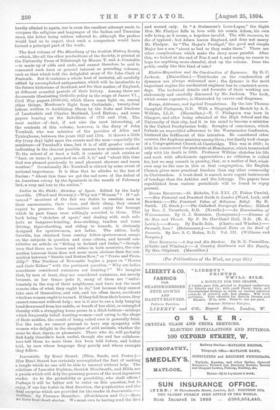Ladies in the Field: Sketches of Sport. Edited by the
Lady Greville. (Ward and Downey.)—Why not " Women " ? If " ad- vanced" members of the fair sex desire to emulate men in their amusements, their vices, and their slang, they cannot expect to preserve the immunities and enjoy the homage which in past times were willingly accorded to them. This book being " sketches of sport," and dealing with such sub- jects as kangaroo-hunting, deer-stalking, tandem and team driving, tiger-shooting, and riding to hounds, is obviously designed for sportswomen, not ladies. The editor, Lady Greville, has obtained from sundry fellow• sportswomen essays on the subjects in question and some others, and herself con- tributes an article on "Riding in Ireland and India,"—though, save that there are horses and riders in both countries, the con- nection between them does not seem more obvious than the con- nection between "Russia and Rotten Row," or "Persia and Picca- dilly." The Duchess of Newcastle begins a paper on "Horses and their Riders" with the pertinent question, " Why are ladies sometimes considered nuisances out hunting ?" We imagine that, by men at least, they are considered nuisances, not merely because, as her Grace puts it, many of them are "unfor- tunately in the way of their neighbours, and have not the most remote idea of what they ought to do," but because they cannot take care of themselves, and risk, and too often incur, accidents which no woman ought to hazard. If they fall from their horses, they cannot remount without help ; nor is it nice to see a lady hanging head downward from her saddle, or bereft of her skirt, or entangled thereby with a struggling horse prone in a ditch bottom—mishaps which frequently befall hunting-women—and owing to the shape of their saddles, the result of being rolled over is generally fatal. For the rest, we cannot pretend to have any sympathy with women who delight in the slaughter of wild animals, whether the same be deer, tigers, or pheasants. Those who do, will probably find Lady Greville's book useful, though she and her collabora- tors tell them no more than has been told before, and better told, by men whose language they parody and whose example they follow.
































 Previous page
Previous page